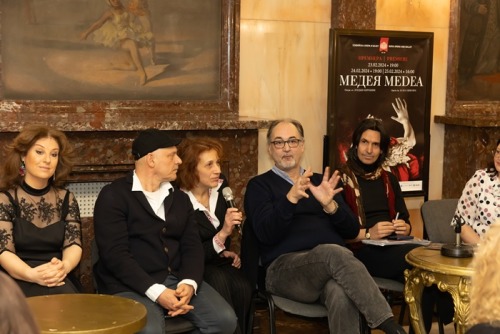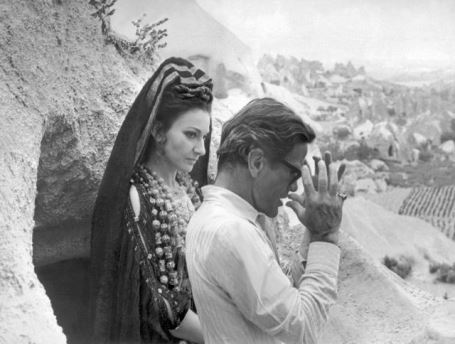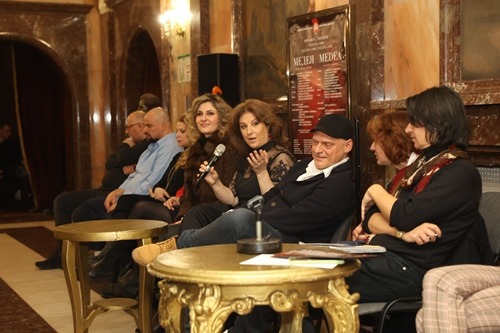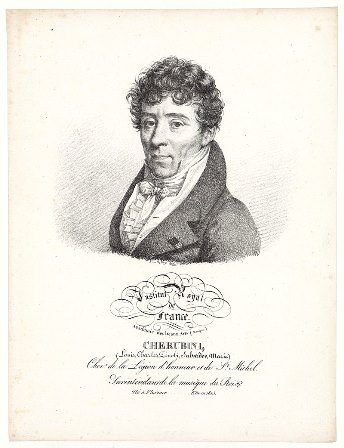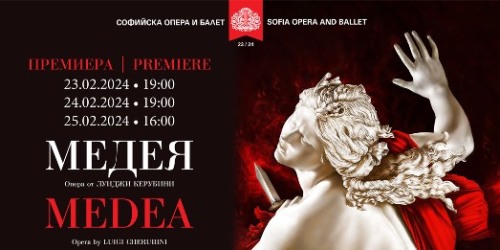An extraordinary event not only for the musical life in Bulgaria is about to take place at the National Opera and Ballet – for the first time the opera "Medea" by Luigi Cherubini (1760-1842) will be staged. It is a tradition in the opera house to stage titles that have not been performed before – "Medea" is part of this long list that includes "Don Quixote", the three operas of Carlos Gómez, Bernstein's "Candide"...
The production of "Medea" was planned to be done outdoors last season, but due to various circumstances has been postponed for this year at the theatre. It is a tribute to Maria Callas – last year many of the Opera House's spectacles were dedicated to the centenary of the extraordinary opera prima. One of the highlights on opening night, and in this season, is the 110th anniversary of the great Boris Christoff's birth. He did a memorial production of "Medea" with Maria Callas at the Rome Opera. Fortunately, there are recordings of this performance, which has been inspirational to opera singers around the world.
Maria Callas as Medea
The artistic team of the National Opera and Ballet's production of "Medea" is Bulgarian-Italian and can rightly be described as stellar. It is to the theatre's exceptional credit that it has attracted Marco Gandini, a world name in opera who worked as an assistant to Franco Zeffirelli himself, to direct the production. The meeting organised with the production team and some of the main performers in "Medea" was in itself a press conference-spectacle about the music of Cherubini, a relatively rarely performed composer, and about the challenge and inspiration for the artists involved, from the various professions of the operatic art. The production is being prepared by an elite Italian team: conductor Francesco Rosa, director Marco Gandini, set designer Andrea Tocchio, costume designer Mario Dice.
Conductor Maestro Francesco Rosa has long worked with the ensemble of the National Opera, conducting some of the most attractive titles in the repertoire – "Lakmé" by Delibes, "La Dona del Lago" and "Il Barbiere di Siviglia" by Rossini.
"This is my first time working with "Medea". I have not had the opportunity to conduct this opera before, so I studied it very carefully. It suggests dramatic power. It is an opera that is much loved and appreciated by many composers – Brahms, Beethoven, Wagner, Tchaikovsky, especially Brahms. Mostly by foreign composers and less by Italians. They look for the melody as Italian music. It is rather a style where the word takes on a meaning of its own. The drama, the power, the meaning is more in the word – each phrase has enormous dramatic power. And psychological depth in each character, especially Medea, of course. It's really worthy, without exaggeration – Cherubini manages to create tension. It's very reminiscent of Gluck's operas, and influenced by Mozart. I'm still working, still studying the music – every phrase is extremely dramatic.
From left to right: Lilia Kehayova, Marco Gandini, Francesco Rosa and Andrea Tocchio
There's a symphonic sound in every single aria, it's very distinct... No matter how big the orchestra is, it's actually like a transition into Romanticism. Cherubini was an Italian, an almost unknown composer, but he made wonderful music. There's a lot of his French style in the music, i.e. the recitatives are recited. In our case they are sung, as we sing in Italian. It's an opera of the actors. We can enjoy the acting, the interpretation of the performers – it's extremely difficult for them. To express his dramatic idea, the composer didn't think much about the performers." said Maestro Francesco Rosa, noting that he found it strange that "Medea" is forgotten, even though it has always been a success, especially among musicians. He stressed that he has been coming to our country for many years and he sees a great desire for understanding, for deepening the work of our National Opera Theatre. According to him, for "Medea" "we have the ideal voices – both vocally and performatively. This is exceptional for them after Wagner, "Don Carlo" – "Medea" is an opera like Gluck's and Mozart's, which I mentioned, an opera in which the performance must respect certain requirements of lightness... No trumpets, no percussion. A very light opera where the strings are the basis of the sound. The performance as a way of sounding is like Beethoven's first symphonies, like Mozart's last symphonies." The conductor elaborated on his work on the piece and went into rehearsal...
The first performance of "Medea" was on 13 March 1797 in Paris. It was first performed in Italy only on 30 December 1909 at La Scala in Milan, after the entire libretto had been translated into Italian. "Medea" aroused the admiration of a whole generation of German composers – Beethoven, Weber, Schumann, Brahms and Wagner. But it has long remained forgotten. A 1953 production in Italy starring Maria Callas revived it. In 1969, Pier Paolo Pasolini made the film "Medea" with it, not using the music from Cherubini's opera but sparking interest in it.
Maria Callas and Pier Paolo Pasolini during the filming of "Medea"
Director Marco Gandini is one of the new generation of talented Italian directors. He has been assistant to Franco Zeffirelli and Graham Vick, and his recent engagements include La Scala di Milano, Hamburg, Caracas, Spoleto Festival and others. From meeting him, we learned a lot in his stories, in what he shared, even in his, really, "directorial" interjection while his colleagues talked. First he interjected with his personal comment on why "Medea" is rarely staged. In his opinion, this happens with operas by Bellini ("Somnanbula"), Donizetti ("Anna Bolena" and "Maria Stuarda") because there are no singers to perform them at the level. But when others come along who perform these roles in an exceptional way the opera becomes famous. He gave the example of one of the great Italian composers, Ermanno Wolf-Ferrari (1876-1948) and his opera "Sly", based on Shakespeare's comedy "The Taming of the Shrew". When it was staged in the 1990s, starring Plácido Domingo and José Carreras, many opera houses included "Sly" in their repertoire.
Gandini is in our country for the first time and very emotionally shared his experience of working with singers, "I have never been to Bulgaria before. The reason that aroused my enthusiasm was the vocality of Bulgarian singers. In Italy, from the age of 22, I worked with Mirella Freni, Ghena Dimitrova, Nicolai Ghiaurov, Raina Kabaivanska, Mariana Pencheva, and later with Krassimira Stoyanova. In my youth I learned exclusively from Bulgarian performers – in Italy and all over the world. Especially Ghiaurov, Dimitrova – an extraordinary woman, we all remember Ghena on stage. I always imagined that Bulgaria is a country where there is a significant culture and history in vocality. It is one of the countries of voices. Now when I work with artists, I meet this culture of voice. Then I feel and hear the voices that have a vocal presence. Today we have vocal performances that are wonderful as a voice but sometimes have no presence. I work with singers performing on big stages – La Scala, for example – but they don't have presence. I don't feel the voice – the sound comes out, but I don't feel the presence. Everyone here has a vocal presence, which is wonderful. Doing "Medea" with a culture of Bulgarian singers is much more interesting than doing it somewhere else..."
Marco Gandini
The score of "Medea" does not include a ballet. But it will be in the production. This is the original choice in the director's decision to add a ballet. Why? "This is a dramatic opera, it belongs to musical neoclassicism. I wanted to include a stylistic element that was elegant." argues Marco Gandini. The cast includes a 12-piece corps de ballet and a pair of soloists. The ballet is made up of boys – these are Jason's Argonauts from his ship "Argo" on their way to Colchis in search of the Golden Fleece. They perform manfully, such is the choreography. Then come the women – they represent the sensuality of Glauce, for whom Jason abandons Medea. In Act III they become nemesis (in Greek mythology Nemesis is the goddess of retribution, close to Dike, goddess of justice – AN). This is how the director explained the female presence in the ballet. (He did not say Erinyes, goddesses of vengeance in Greek mythology – AN) They are constantly around Medea in this act...
The choreography is by Lyudmila Ilieva, who is a solo ballerina at the Sofia Opera and Ballet, but now takes on a different role. She thanked the set designer Andrea Tocchio for creating space for them in his solution. Andrea Tocchio has worked as a scenographer and lighting designer, performing various projects in Italy, the Netherlands, Georgia, Belgium, Brazil, Hungary, France, Spain, Switzerland, the Arab Emirates, Saudi Arabia. His most recent set designs are for the Rome production of Ullmann's "Der Kaiser von Atlantis", and Mozart's "Le Nozze di Figaro" for the Estonian Opera.
"I am very grateful to be part of this adventure with the whole team – "Medea" in Sofia. Let's focus on lighting and sets. My inspiration for the set is based on Medea and Glauce, together with the performance team we were inspired by Greek mythology, with the technical team – extremely good and very professional – we are currently finishing the sets. Act I is inspired by Glauce in colour and in specific objects. The atmosphere in Act II and III is completely different, the space is organized differently, the stage elements are arranged differently – i.e., this is now Medea's space. The sets are inspired by Corinthian architecture, but there is a new look – we made the sets vertical, like the columns of a Greek temple. In some scenes there are more, in others less, all identifying with the temple where Medea has contact with the gods," said the set designer.
Fashion designer Mario Dice is preparing the costumes for this impressive production, which will arrive directly from his studios in Italy. On 20 February he will present his collection during Milan Fashion Week and will come back to Bulgaria for the premiere of "Medea".
From left to right: Violeta Radomirska, Tsveta Sarambelieva, Diana Lamar and Lilia Kehayova
The role of Medea is a dream for every soprano, share the three soloists of the opera who are preparing the part – Gabriela Georgieva, Lilia Kehayova and Diana Lamar. Jason, the unfaithful lover of the sorceress, will be portrayed by Daniel Ostretsov and Daniel Damyanov, while Petar Naydenov and Stefan Vladimirov will perform the role of Créon, the king of Corinth. One of the important characters in the operatic intrigue is Néris, the faithful companion of Medea, who will be portrayed by Violeta Radomirska and Tsveta Sarambelieva. The role of the tender Glauce, who must marry Jason but falls victim to Medea's revenge, is entrusted to Stanislava Momekova and Diana Vasileva.
"I'm very happy to be doing this role because I've known opera for over 10 years. I was introduced to it on a short stay in Italy, saw Maria Callas's recording and for weeks that was all I listened to. I was saying to myself, "My God, what an opera! Someday I could sing it." Curiously, in 2021, when I gave another interview, to one of the questions "What do you dream of as a future role" I answered "To sing Medea". I never imagined that my theatre – the Sofia Opera and Ballet – would make this dream come true so soon. We are working "Medea" with one of the greatest directors Marco Gandini, a student of Zeffirelli, an extremely inspiring personality. Because, besides working "Medea" we are constantly analysing, he talks about his life with the greatest opera singers of our time." said Lilia Kehayova and added professionally, "For me, "Medea" is a very happy event because somehow I continue with this line of ancient Greek drama after my performance in "Elektra" by Richard Strauss. The challenge in "Elektra" is no less, although the two roles are very different. In "Medea" I like very much that she is such a complex character, for an artist, a singer, that is invaluable: to be able to approach, to be provoked to do, to sing such a role, to develop such a character – because we can't look at her one-dimensionally. Whether she's just a murderer of her children or not. The vocal role requires a lot of nuance, very dramatic singing, especially in Act III, where the real drama of Medea is – whether or not she's going to kill her children – and at the same time nuance that I find very satisfying, I hope I can handle as a dramatic soprano."
Diana Lamar
For the other Medea, Diana Lamar, the role is special. After two roles in German repertoire and in Russian (Wagner's "Der fliegende Holländer" and Richard Strauss' "Elektra", as well as in Russian Tchaikovsky's "Eugene Onegin" and "The Queen of Spades"), this will be the first time we will see her in an Italian opera. Traditionally, the path of opera singers is reversed... "Now maestro Plamen Kartaloff has given me this huge chance and I am glad that he sees me in such a strong and beautiful role as Medea. For me it is a wonderful role, I like the music very much. It's a great challenge to sing such a difficult dramatic story in this strictly classical musical structure – how to sing such a sweet melody in such a terrible, difficult story. That's the interesting thing. And an outstanding team who lead us very well." said Diana Lamar.
"I am fortunate to know this opera. Of course, we are happy to work with people who know and have experience in the operas of this period, because vocally I have to say that the opera "Medea" is much closer in sound to the pre-classics than to the classics. Here, purely musically: any kind of glissandi, descending, ascending, pads are absolutely out of the question. So the singer's voice is limited to being able to use the colours in her voice and the dynamics, and the musically recognised rules of sound extraction are absolutely forbidden," comments Violeta Radomirska, who takes on the role of Néris.
However paradoxical, perhaps, the basses Petar Naydenov and Stefan Vladimirov in the role of Créon will be the most complicated because great Bulgarian opera singers have performed the part and their performances continue to thrill and delight us to this day.
Stefan Vladimirov
"I join all my dear colleagues in saying that it is truly a wonderful moment for us to work with Maestro Gandini and his entire team and Maestro Rosa. Opera is also difficult for us with Stefan Vladimirov, the other Créon. Our aria is not so melodic, but instead it is very difficult, extreme. So, we will do our best. It's difficult after such world-class singers and basses who have sung this operatic role before us, it's difficult, but they are a shining example for us." Said Petar Naydenov. And Stefan Vladimirov continued his thought, "This, really, is a vocal challenge, for me especially. At one rehearsal we were singing the aria and my colleague said: 'The aria is over, now call the ambulance'. Working on the role was a huge pleasure. Our director Marco Gandini is a great textbook. We started talking word by word. Of course, most of us speak Italian, but he said he had worked in Italy in La Scala with other singers and we started reading, pronouncing. Because he claimed that Italians make mistakes with double consonants. We worked this for a few days, methodically. And it was very fruitful for our interpretation of the lyrics for the role."
From left to right: Violeta Radomirska, Tsveta Sarambelieva, Diana Lamar, Lilia Kehayova, Marco Gandini, Andrea Tocchio and Lyudmila Ilieva
Although the opera "Medea" will have its premiere in Bulgaria only this year, a number of Bulgarian singers have participated in various productions around the world over the years. First of all, these are our famous basses – Boris Christoff, Nicolai Ghiaurov, Nicola Ghiuselev and Dimitar Petkov, whose interpretations of Créon's character are among the most recognized operatic examples. Magnificent performers of Néris were the mezzo-sopranos Margarita Lilova and Alexandrina Milcheva. Another mezzo-soprano who has portrayed the character of Medea's faithful assistant is Violeta Radomirska, who participated in a production in 2000 in Zurich and only a month ago performed the role again in Bergen, Norway. Sonya Yoncheva is the only Bulgarian singer who has performed the role of Medea – in Berlin in 2018. We are sure that we are in for a real musical experience at the performances of Cherubini's "Medea" on the stage of the National Opera and Ballet on 23, 24 and 25 February.
And instead of an afterword, we would like to mention some statistics so that the impression does not remain that the composer Luigi Cherubini with his exceptional biography and as a music teacher and director of the Paris Conservatory is not unknown in Bulgaria, especially for music lovers. In the already distant year of 1958, on 3 July, the then young outstanding conductor and composer Konstantin Iliev was at the stand in Bulgaria Hall for a concert of opera arias and overtures with the participation of the even younger Nicolai Ghiaurov and Julia Wiener, future stars. Then on the programme was the overture to Cherubini's opera "Anacreon" (1803). The work has been almost repertoire over the years for the Sofia Philharmonic and even in December 2010 they performed it several times, including on tour in Italy. The overture has also been on Radio Orchestra programmes.
From left to right: Violeta Radomirska, Tsveta Sarambelieva, Diana Lamar, Lilia Kehayova, Marco Gandini, Andrea Tocchio, Lyudmila Ilieva, Petar Naydenov and Stefan Vladimirov. In front of them 7 years old Viki, one of Medea's children
However, the most performed work of the composer, who was born in Florence and died in Paris, is Requiem in C minor for mixed chorus and orchestra /in memory of Louis XVI/. It has been conducted by eminent conductors such as Ruslan Raichev, Vasil Stefanov, foreign guests such as Luciano di Martino...
And the myth of Medea has for millennia excited philosophers, poets, playwrights, artists, musicians, in more recent times psychoanalysts, and probably many people unsophisticated in art. But that is another story we have written about, albeit in a contemporary context. Now we await the premiere at the National Opera and Ballet of Luigi Cherubini's "Medea." Congratulations on the creative choice.


